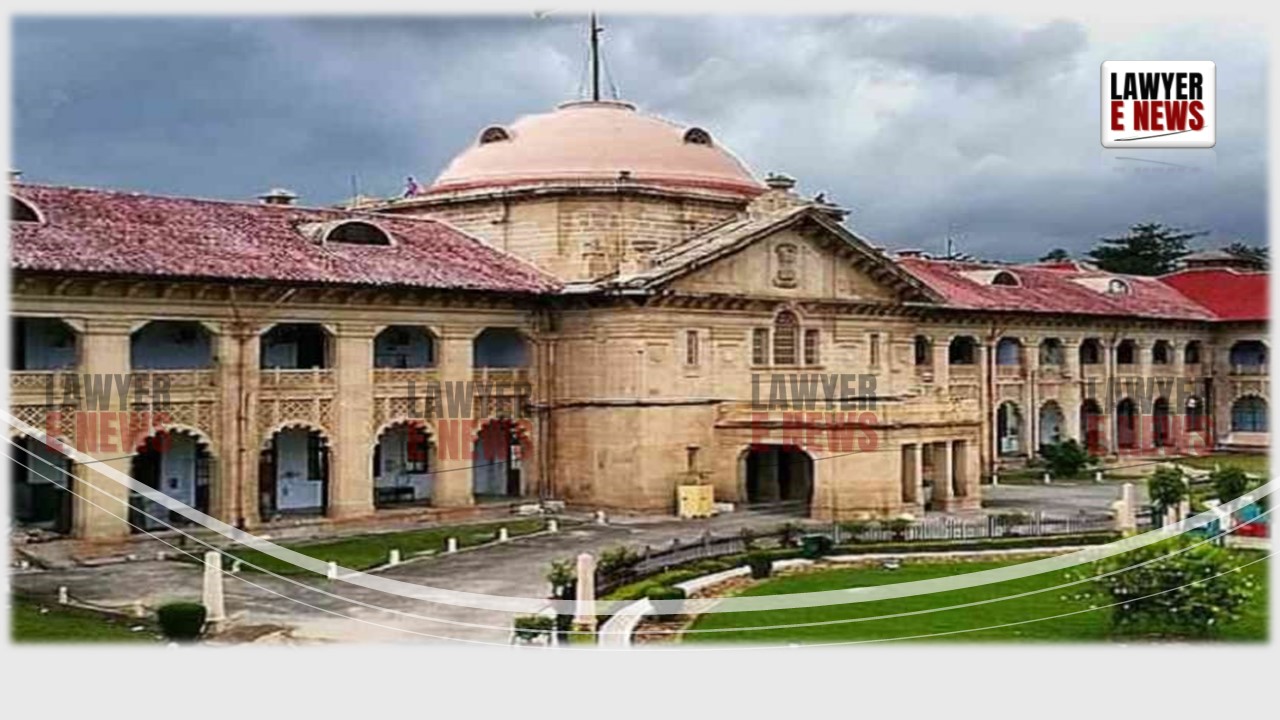-
by Admin
15 February 2026 2:16 AM



On September 11, 2024, the Allahabad High Court, in the case of Mritunjay Tiwari and 6 Others v. State of U.P. and Another, delivered a significant judgment rejecting an application to quash a charge sheet in a dowry death case. The case, involving the mysterious disappearance of the wife of the lead applicant, centered on allegations of dowry-related cruelty, despite no recovery of the body. The Court ruled that the absence of a corpse does not undermine the prosecution's case, provided there is enough circumstantial evidence to suggest foul play. "Body Recovery Not Essential When Circumstantial Evidence Exists"
The applicants, led by Mritunjay Tiwari, were implicated after his wife, Manju Tiwari, disappeared on September 23, 2016. Initially, both families searched for her, believing she had simply gone missing. A missing person report was filed, and the family even published notices in newspapers. However, six weeks later, Manju’s father filed a criminal complaint under Section 156(3) Cr.P.C., alleging that his daughter had died in suspicious circumstances connected to dowry demands. He accused the applicants of concealing her body to cover up the crime.
This led to the lodging of an FIR against Mritunjay and six of his relatives under Sections 498-A (cruelty related to dowry demands), 304-B (dowry death), 201 IPC (causing disappearance of evidence), and Section 3/4 of the Dowry Prohibition Act at the Padrauna Police Station, Kushinagar district. Investigations that followed were unable to recover Manju's body, leading to challenges in the case.
Lower Court Findings and Procedural History: Initially, the police filed a charge sheet under Section 498-A IPC and the Dowry Prohibition Act but avoided Section 304-B (dowry death), citing a lack of evidence due to the absence of the victim's body. However, the Chief Judicial Magistrate of Kushinagar returned the charge sheet, ordering further investigation. The Court criticized the investigation as incomplete, calling it a mere formality and accusing the Investigating Officer of failing to probe all angles properly.
A subsequent protest petition filed by the complainant led to another charge sheet being returned for reinvestigation. Eventually, after several rounds of investigation and pressure from contempt proceedings initiated by the complainant, a final charge sheet was submitted on February 12, 2020, which included charges under Section 304-B IPC. The trial court took cognizance of this charge sheet and summoned the applicants on March 5, 2020.
The applicants moved the Allahabad High Court, challenging the charge sheet, the cognizance order, and the summoning order. They argued that no dowry death could be established without evidence of the victim's death or recovery of her body.
"Body Recovery Not Essential When Circumstantial Evidence Exists"
Corpus Delicti (Recovery of the Body): The primary defense of the applicants was that without the recovery of the body, there was no proof of death, and therefore, the charge under Section 304-B IPC for dowry death could not be sustained. The Court rejected this argument, citing precedents from the Supreme Court in Sanjay Rajak v. State of Bihar (2019) and Sevaka Perumal v. State of Tamil Nadu (1991). The court reiterated that while the recovery of the body is significant, it is not indispensable. As held in these cases, circumstantial evidence, when sufficiently strong, can establish the occurrence of a dowry death even in the absence of a corpse.
Delay in Filing the FIR: The Court addressed the defense’s claim that the delay in filing the FIR—about six weeks after Manju’s disappearance—cast doubt on the complainant’s case. The court found this unconvincing, noting that the delay was due to the applicants' misleading conduct, which initially convinced the complainant that the situation involved only a missing person case. This strategy by the applicants delayed the filing of the FIR, but once the father realized the deception, the complaint was promptly filed. The Court held that such delay did not weaken the prosecution’s case in these specific circumstances.
Misleading the Investigation: Justice Saurabh Shyam Shamshery observed that the applicants had misdirected both the complainant and the investigation, suggesting that Manju might have eloped with someone. This theory was debunked during the investigation, as there was no evidence to support such a claim. The Court found that the applicants' efforts to delay the investigation and mislead authorities were part of an attempt to cover up the real events.
Dowry Cruelty and Circumstantial Evidence: The court noted that there was substantial evidence of cruelty related to dowry demands from witnesses, including Manju’s family. This, combined with her unexplained disappearance, led the court to infer that she had likely died under circumstances related to dowry harassment. The lack of a body did not absolve the accused, as sufficient circumstantial evidence pointed toward their involvement in her death.
Rejection of Mini-Trial at Charge-Sheet Stage: The applicants also attempted to argue that the charge sheet was based on insufficient evidence. However, the Court emphasized that, at the stage of challenging the charge sheet, it cannot conduct a "mini-trial" to evaluate the evidence’s sufficiency. Citing the Supreme Court’s recent ruling in Priyanka Jaiswal v. State of Jharkhand and Others (2024), the Court clarified that the correctness of the allegations would be tested during the trial, not at the stage of quashing.
The Allahabad High Court, while dismissing the application, emphasized that the absence of a body does not automatically invalidate a prosecution for dowry death if there is other compelling evidence. The Court upheld the charge sheet and the summoning of the accused, ruling that all arguments could be addressed during the trial or through the discharge applications pending before the trial court.
Date of Decision: September 11, 2024
Mritunjay Tiwari and 6 Others v. State of U.P. and Anot
